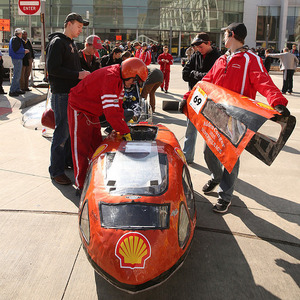Shell announces results of 2015 Eco-Marathon

Rex Larson, Shell
April 16, 2015
BY Erin Krueger
Shell has announced a team from Colorado has won the prototype alternative fuels category at the Shell Eco-Marathon held in Detroit this month using an ethanol-powered vehicle.
The team, from the University of Colorado, Boulder, achieved 841 miles per gallon in its Tatankatoo vehicle using ethanol. The second place winner for the prototype alternative fuels category was Universidade Tecnológica Federal do Paraná with 742 miles per gallon.
According to Shell, this year’s 30th anniversary event attracted 113 teams, representing more than 1,000 high school and university students, from across the Americas, including Brazil, Canada, Guatemala, Mexico and the U.S. Of the teams entered this year, 51 vehicles were fielded by high school s and 62 came from universities.
Advertisement
Advertisement
Before hitting a new and hilly track through the streets of downtown Detroit, teams had to make tweaks and, in some cases, major adjustments to pass detailed technical and safety inspections. Of 111 teams that made it to the inspections, only 89 passed. The track also proved challenging for student drivers who had to steer their low-slung, futuristic vehicles through sharp turns and elevation changes as spectators cheered them from the sidelines.
“A little more than 100 years ago, just two blocks away, there was a young fellow by the name of Henry Ford working on his quadricycle. He tested it on these streets where he achieved 10 to 20 mpg at the time,” said Detroit Mayor Mike Duggan. “When you consider the achievements of these bright young minds, creating vehicles of the future that can travel more than 2,000 miles on a single gallon of fuel, I am amazed at the progress and inspired by what the future may hold.”
“This year’s event in Detroit has been everything we imagined it would be; showcasing innovation, human ingenuity, teamwork and perseverance,” said Niel Golightly, vice president of external relations for Shell Americas. “Through the competition, together with our partners, Shell challenges future engineers to think creatively and act practically with hand-on opportunities to stretch the boundaries of energy efficiency. There is no doubt that these students have a bright future ahead and will positively shape transport and mobility in the years to come.”
Advertisement
Advertisement
The top team overall was the University of Toronto, which built a vehicle that achieved 3,421 miles per gallon using gasoline. While the three top performing vehicles were all in the gasoline prototype category, teams also entered a variety of vehicles fueled by diesel, ethanol, electric batteries, compressed natural gas, gas-to-liquid fuels and hydrogen power.
Additional results from the 2015 Shell Eco-Marathon are available on the Shell website.
Related Stories
Broco Energy on July 17 announced a new partnership with the Massachusetts Port Authority (Massport) to deliver and transition Massport's fuel tanks to renewable diesel across its various facilities.
Shell Aviation, Accenture, and Amex GBT on July 10 announced Avelia is in the process of evolving to an industry solution with independent data hosting and a multi-supplier model helping users access the GHG benefits of SAF.
The U.S EPA on July 17 released data showing more than 1.9 billion RINs were generated under the RFS during June, down 11% when compared to the same month of last year. Total RIN generation for the first half of 2025 reached 11.17 billion.
The U.S. EPA on July 17 published updated small refinery exemption (SRE) data, reporting that six new SRE petitions have been filed under the RFS during the past month. A total of 195 SRE petitions are now pending.
European biodiesel producer Greenergy on July 10 confirmed plans to shut down its biodiesel plant in Immingham, Lincolnshire, U.K. The company temporarily suspended operations at the facility earlier this year.
Upcoming Events










